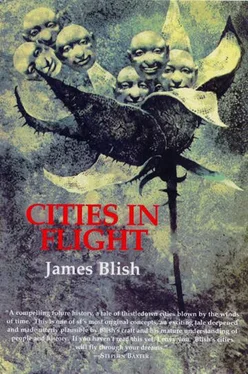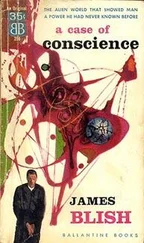James Blish - Cities in Flight
Здесь есть возможность читать онлайн «James Blish - Cities in Flight» весь текст электронной книги совершенно бесплатно (целиком полную версию без сокращений). В некоторых случаях можно слушать аудио, скачать через торрент в формате fb2 и присутствует краткое содержание. Жанр: Фантастика и фэнтези, на английском языке. Описание произведения, (предисловие) а так же отзывы посетителей доступны на портале библиотеки ЛибКат.
- Название:Cities in Flight
- Автор:
- Жанр:
- Год:неизвестен
- ISBN:нет данных
- Рейтинг книги:4 / 5. Голосов: 1
-
Избранное:Добавить в избранное
- Отзывы:
-
Ваша оценка:
- 80
- 1
- 2
- 3
- 4
- 5
Cities in Flight: краткое содержание, описание и аннотация
Предлагаем к чтению аннотацию, описание, краткое содержание или предисловие (зависит от того, что написал сам автор книги «Cities in Flight»). Если вы не нашли необходимую информацию о книге — напишите в комментариях, мы постараемся отыскать её.
Cities in Flight — читать онлайн бесплатно полную книгу (весь текст) целиком
Ниже представлен текст книги, разбитый по страницам. Система сохранения места последней прочитанной страницы, позволяет с удобством читать онлайн бесплатно книгу «Cities in Flight», без необходимости каждый раз заново искать на чём Вы остановились. Поставьте закладку, и сможете в любой момент перейти на страницу, на которой закончили чтение.
Интервал:
Закладка:
“Evita, stop sounding like a tract. Obviously you’re advanced to a higher, more Jovian plane of existence, but won’t you still need your metabolism? Or have you decided that vitamins are all-in-the-mind?”
“Now you’re being superior. Anyhow, alcohol isn’t a vitamin. And I didn’t come to talk about that. I came to tell you something I think you ought to know.”
“Which is—?”
She said: “Bob, I mean to have a child here.”
A bark of laughter, part sheer hysteria and part exasperation, jack-knifed Helmuth into a sitting position. A red arrow bloomed on the far wall, obediently marking the paragraph which, supposedly, he had reached in his reading. Eva twisted to look at it, but the page was already dimming and vanishing.
“Women!” Helmuth said, when he could get his breath back. “Really, Evita, you make me feel much better. No environment can change a human being much, after all.”
“Why should it?” she said suspiciously, looking back at him. “I don’t see the joke. Shouldn’t a woman want to have a child?”
“Of course she should,” he said, settling back. The pages began to flip across the wall again. “It’s quite ordinary. All women want to have children. All women dream of the day they can turn a child out to play in an airless rock garden like Jupiter V, to pluck fossils and make dust-castles and get quaintly starburned. How cosy to tuck the blue little body back into its corner that night, and give it its oxygen bottle, promptly as the sound of the trick-change bell! Why it’s as natural as Jupiter-light—as Western as freeze-dried apple pie.”
He turned his head casually away. “Congratulations. As for me, though, Eva, I’d much prefer that you take your ghostly little pretext out of here.”
Eva surged to her feet in one furious motion. Her fingers grasped him by the beard and jerked his head painfully around again.
“You reedy male platitude!” she said, in a low grinding voice. “How you could see almost the whole point, and make so little of it— Women, is it? So you think I came creeping in here, full of humbleness, to settle our technical differences in bed!”
He closed his hand on her wrist and twisted it away. “What else?” he demanded, trying to imagine how it would feel to stay reasonable for five minutes at a time with these Bridge-robots. “None of us need bother with games and excuses. We’re here, we’re isolated, we were all chosen because, among other things, we were quite incapable of forming permanent emotional attachments and capable of any alliances we liked without going unbalanced when the attraction died and the alliance came unstuck. None of us have to pretend that our living arrangements would keep us out of jail in Boston, or that they have to involve any Earth-normal excuses.”
She said nothing. After a while he asked, gently: “Isn’t that so?”
“Of course it’s not so,” Eva said. She was frowning at him; he had the absurd impression that she was pitying him. “If we were really incapable of making any permanent attachment, we’d never have been chosen. A cast of mind like that is a mental disease, Bob; it’s anti-survival from the ground up. It’s the conditioning that made us this way. Didn’t you know?”
Helmuth hadn’t known; or if he had, he had been conditioned to forget it. He gripped the arms of the chair tighter.
“Anyhow,” he said, “that’s the way we are.”
“Yes, it is. Also it has nothing to do with the matter.”
“It doesn’t? How stupid do you think I am? I don’t care whether or not you’ve decided to have a child here, if you really mean what you say.”
She, too, seemed to be trembling. “You really don’t, either. The decision means nothing to you.”
“Well, if I liked children, I’d be sorry for the child. But as it happens, I can’t stand children—and if that’s the conditioning, too, I can’t do a thing about it. In short, Eva, as far as I’m concerned you can have as many kids as you want, and to me you’ll still be the worst operator on the Bridge.”
“I’ll bear that in mind,” she said. At this moment she seemed to have been cut from pressure-ice. “I’ll leave you something to charge your mind with, too, Robert Helmuth. I’ll leave you sprawled here under your precious book … what is Madame Bovary to you, anyhow, you unadventurous turtle? … to think about a man who believes that children must always be born into warm cradles—a man who thinks that men have to huddle on warm worlds, or they won’t survive. A man with no ears, no eyes, scarcely any head. A man in terror, a man crying: Mamma! Mamma! all the stellar days and nights long!”
“Parlor diagnosis.”
“Parlor labeling! Good trick, Bob. Draw your warm woolly blanket in tight around your brains, or some little sneeze of sense might creep in, and impair your—efficiency!”
The door closed sharply after her.
A million pounds of fatigue crashed down without warning on the back of Helmuth’s neck, and he fell back into the reading chair with a gasp. The roots of his beard ached, and Jupiters bloomed and wavered away before his closed eyes.
He struggled once, and fell asleep.
Instantly he was in the grip of the dream.
It started, as always, with commonplaces, almost realistic enough to be a documentary film-strip—except for the appalling sense of pressure, and the distorted emotional significance with which the least word, the smallest movement was invested.
It was the sinking of the first caisson of the Bridge. The actual event had been bad enough. The job demanded enough exactness of placement to require that manned ships enter Jupiter’s atmosphere itself; a squadron of twenty of the most powerful ships ever built with the five-million-ton asteroid, trimmed and shaped in space, slung beneath them in an immense cat’s-cradle.
Four times that squadron had disappeared beneath the racing clouds; four times the tense voices of pilots and engineers had muttered in Helmuth’s ears, and he had whispered back, trying to guide them by what he could see of the conflicting trade-blasts from Jupiter V; four times there were shouts and futile orders and the snapping of cables and men screaming endlessly against the eternal howl of the Jovian sky.
It had cost, altogether, nine ships, and two hundred thirty-one men, to get one of five laboriously-shaped asteroids planted in the shifting slush that was Jupiter’s surface. Until that had been accomplished, the Bridge could never have been more than a dream. While the Great Red Spot had shown astronomers that some structures on Jupiter could last for long periods of time—long enough, at least, to be seen by many generations of human beings—it had been equally well known that nothing on Jupiter could be really permanent. The planet did not even have a “surface” in the usual sense; instead, the bottom of the atmosphere merged more or less smoothly into a high-pressure sludge, which in turn thickened as it went deeper into solid pressure-ice. At no point on the way down was there any interface between one layer and another, except in the rare areas where a part of the deeper, more “solid” medium had been thrust far up out of its normal level to form a continent which might last as long as two years or two hundred. It was on to one of these great ribs of bulging ice that the ships had tried to plant their asteroid—and, after four tries, had succeeded.
Helmuth had helped to supervise all five operations, counting the successful one, from his desk on Jupiter V. But in the dream he was not in the control shack, but instead on shipboard, in one of the ships that was never to come back—
Then, without transition, but without any sense of discontinuity either, he was on the Bridge itself. Not in absentia, as the remote guiding intelligence of a beetle, but in person, in an ovular, tank-like suit the details of which would never come clear. The high brass had discovered antigravity and had asked for volunteers to man the Bridge. Helmuth had volunteered.
Читать дальшеИнтервал:
Закладка:
Похожие книги на «Cities in Flight»
Представляем Вашему вниманию похожие книги на «Cities in Flight» списком для выбора. Мы отобрали схожую по названию и смыслу литературу в надежде предоставить читателям больше вариантов отыскать новые, интересные, ещё непрочитанные произведения.
Обсуждение, отзывы о книге «Cities in Flight» и просто собственные мнения читателей. Оставьте ваши комментарии, напишите, что Вы думаете о произведении, его смысле или главных героях. Укажите что конкретно понравилось, а что нет, и почему Вы так считаете.












